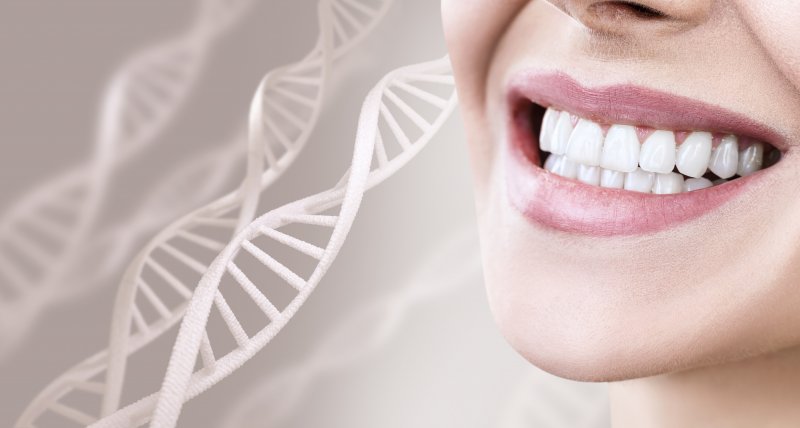Information?

Do your teeth constantly seem dull and yellow, despite your best efforts to keep them clean? There are many reasons for having discolored teeth, but some of them are actually hereditary! Your genetics can heavily influence your enamel and the shade of your teeth; here’s what you need to know about this connection and how cosmetic dentistry might be able to offer a solution for a stained smile that isn’t your fault.
How Can Genetics Influence My Tooth Color?
If it seems like some people are just born with a naturally white smile, that’s absolutely the case; your tooth enamel, which determines the color of your teeth, is genetic. Sometimes thicker, whiter enamel simply runs in the family (if you’re lucky). Other times, you don’t win the lottery and are genetically predisposed to teeth that darken over time.
There are also two notable inherited conditions that can cause tooth discoloration: one is “amelogenesis imperfecta”, which is characterized by soft, fragile enamel that is yellowish-brown in color. This is caused by a genetic mutation and greatly increases the risk of developing tooth decay, while also making your teeth more likely to fracture.
“Dentinogenesis imperfect” can affect both your baby teeth as well as your permanent ones, and it causes the enamel to appear grayish and translucent. It will also make your teeth brittle and susceptible to damage.
What Else Can Stain My Teeth?
Although genetics certainly affect the color of your teeth, many dentists agree that lifestyle also plays a very large role. Some other things that can stain your teeth include:
- Coffee, tea, wine, and sugary beverages like soda
- Candies and foods with high amounts of sugar and corn syrup
- Smoking and chewing tobacco
- Poor oral hygiene
Be mindful of the many substances out there that can potentially tarnish your enamel; this substance doesn’t just determine the color of your teeth, but it’s detrimental to their protection. Once it’s worn down and gone, it’s gone for good!
What Can I Do About My Stained Teeth?
Professional whitening is the absolute best choice for patients with hereditary tooth discoloration. The results are highly impressive and visible within two weeks, and they’re very long-lasting compared to store-bought toothpastes or whiteners. Many dentists offer in-office or take-home whitening options; both work well, and it’s mostly up to your individual needs.
Restorative dentistry is also an option, especially for patients with weakened and tarnished teeth because of a genetic condition. Solutions including veneers, metal-free crowns, and dental bonding can all be used to whiten your teeth while adding additional strength and stability.
You shouldn’t have to suffer because of stained teeth that aren’t even your fault; there is hope for your situation. Your dentist can help to restore your smile’s whiteness, no matter what your genes have to say about it.
About the Practice
Real Dental has served patients and families in the Grand Prairie area for several years. They offer a wide range of services, including many cosmetic options such as porcelain veneers, metal-free crowns, and dental bonding. The practice is led by Dr. Christopher Duong and Dr. John Kuan, who both completed their dental doctorates at the University of the Pacific School of Dentistry in San Francisco. If you would like to schedule an appointment or have questions about tooth discoloration, you can contact Real Dental through their website or by phone: (817) 406-7239.

